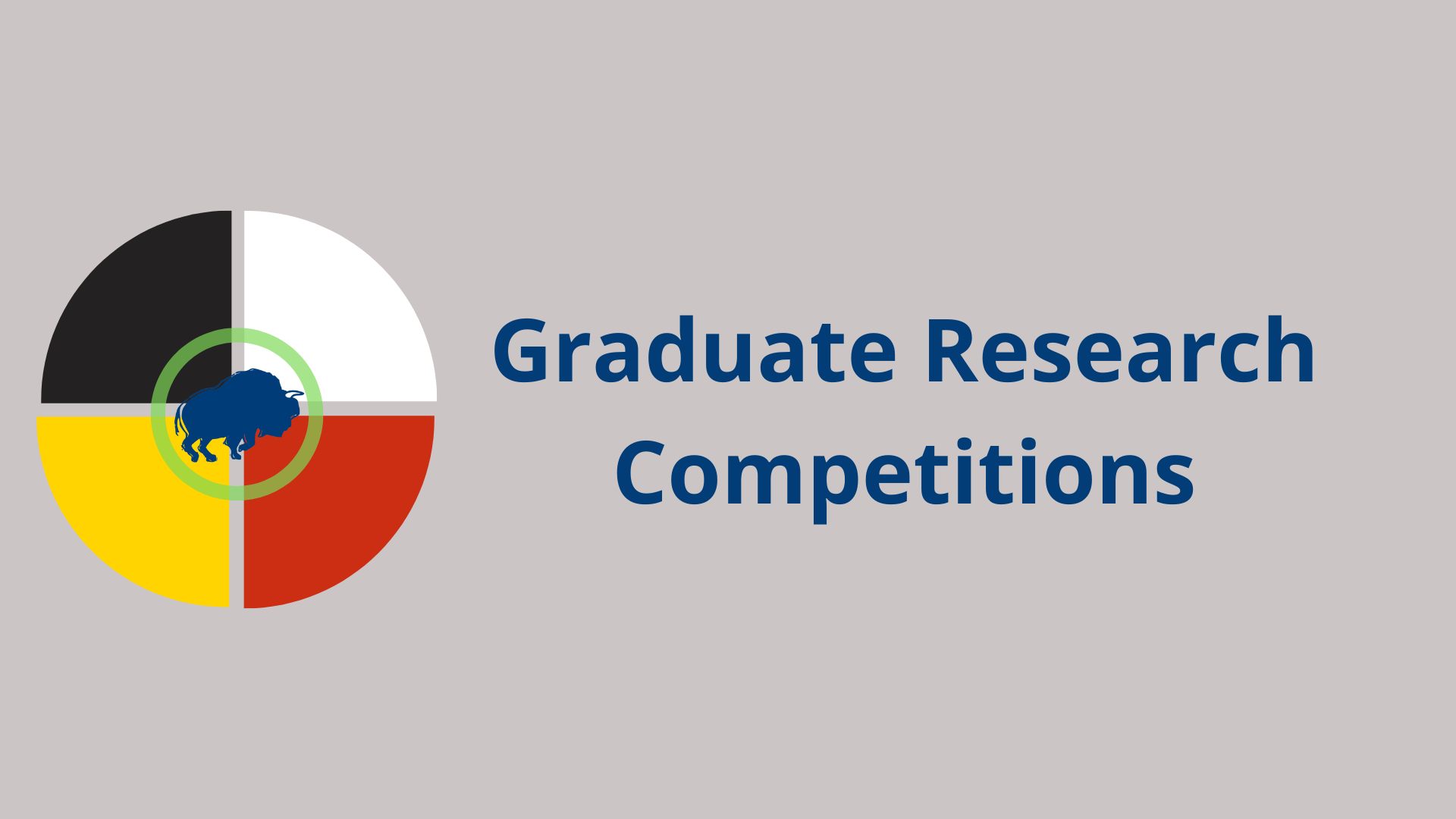The 2024 3-Minute Thesis Finals and Images of Research Competitions will be live-streamed on Saturday, March 23, 2024, from 10:30 AM MST to Noon MST.
Click on the graduate research competitions image above to view the live stream.
A critical piece of the graduate student journey is working towards gaining experience and building skills to support your transition to the next step in your career development journey. Why should graduate students participate?
· Skill-building to support professional development
· Practice sharing your research in a meaningful way
· Earn extra money by winning prizes
· Meet and support other graduate researchers and have some fun!
Two competitions supported through the School of Graduate Studies are 3MT (3-Minute Thesis), and Images of Research.
1) Three Minute Thesis (3MT®) is a research communication competition developed by The University of Queensland that challenges research higher degree students to present a compelling oration on their thesis and its significance in just three minutes in language appropriate to a non-specialist audience. https://threeminutethesis.uq.edu.au/
2) The Images of Research (IoR) competition is a unique opportunity for Graduate Students at the University of Lethbridge to display their research, scholarly and artistic work. The aim of the competition is to provide graduate students with an artistic alternative to highlight their work, as a way to celebrate the diverse research at the University of Lethbridge.
2024 3-Minute Thesis (3MT) Finals
Saturday, March 23, 2024 | 10:30 AM MST – NOON MST | Science Commons SA 6008 and Online
The 3MT Finals will be hosted in collaboration with the Graduate Student Association (GSA) Meeting of the Minds Conference.
The winner will represent the University of Lethbridge at Western Regional 3MT, hosted by the UBC Okanagan in Kelowna, BC on Wednesday, May 8, 2024.
Show your support by coming to the in-person finals or streaming and voting for the people’s choice winner.
Voting opens on Saturday, March 23rd, 2024 at 10:30 AM MST and closes on Saturday, March 23rd, 2024 at 11:55 AM MST. Voting will only be open during the finals competition.
2024 3-Minute Thesis People's Choice Voting Form
3MT Finalists
Title: Unraveling sex differences in spatial abilities: A pathway towards fostering STEM learning
Supervisor: Dr. Claudia Gonzalez
Abstract:
Spatial abilities (SA) allow us to locate objects in the environment and safely navigate the world around us. SA have also shown to be a predictor of Science, Technology, Engineering and Mathematics (STEM) success. Interestingly, males outperform females in most SA tasks. However, most research has used visual spatial information. My research investigated sex differences in SA using visual, auditory, and haptic (sense of touch and limb location) information. By investigating how females and males process spatial information through all their senses, we can better develop training tools and educational programs to improve SA and to foster STEM learning.
Title: Enhancing Executive Functions Through Play
Supervisor: Dr. Robbin Gibb
Abstract:
My research focuses on improving adolescent executive functions (EF) through play. The research program in question is testing a curriculum of games, table top and physical games, developed for teenagers. The goal behind the games builds on the Building Brains Together program for children, by using game play to strengthen EF skills. The program is tested through surveys, psychometric tests and lego motor tasks.
Title: Colonial Shadows: Addressing Mental Health Disparities Among Asian Immigrants
Supervisor: Toupey Luft
Abstract:
In my research, I explore the impact of colonial legacies on mental health care for Asian immigrants, highlighting how Eurocentric approaches, cultural appropriation, and historical traumas shape their experiences. My research employs postcolonial theory and narrative inquiry to unveil the disparities in current mental health practices. I advocate for a shift towards culturally sensitive care that considers traditional values and healing practices, addressing the consequences of misdiagnosis, service underutilization, and alienation. This study not only challenges existing paradigms but also proposes an inclusive framework for mental health care, emphasizing the importance of acknowledging and integrating diverse cultural perspectives.
Title: Chronic gut inflammation changes threat coping behaviour in females
Supervisor: Dr. Aaron Gruber
Abstract:
My research investigates how chronic gut inflammation changes threat coping behaviour in female mice through a dextran sodium sulfate (DSS) model of inflammatory bowel disease (IBD). Individuals with these diseases are 2-4X more likely to develop anxiety and depression than healthy populations, it is even more common in females with IBD. New research is uncovering the central role that mitochondria play in depression and anxiety, and the unique way estrogen communicates to mitochondria may contribute to elevated rates in females. This line of rodent studies will direct future human research to find more effective treatments for depression and anxiety.
Title: Population Models for Rare Plants
Supervisor: Dr. Jenny McCune
Abstract:
Population models can help understand how populations of rare plant species are doing--whether the populations are increasing or decreasing. I'm trying to understand the population dynamics of some populations of four rare plants in southern Ontario, and whether the environment is influencing those population changes.
Title: Slot Machine Reward Schedules: What Makes them so Enticing?
Supervisor: Dr. David Euston
Abstract:
It's estimated that Canadians spend ~$20 billion dollars gambling each year, but why would you play a game when you know the odds are stacked against you? My research uses a novel schedule preference task to demonstrate the main allure of gambling reward schedules is actually based on the delay to receiving rewards, rather than randomness or uncertainty. This has widespread implications not only for gambling regulation, but also for how we interpret the value of everyday activities in our own lives.
Title: Ecological Football: Making a Conservation Touchdown!
Supervisor: Dr. Jenny McCune
Abstract:
"How can we determine the relative influence of factors limiting a species' distribution? And how does ecology relate to a game of football? Let me explain how my research on the wood poppy can be used to inform conservation with an experimental seed addition. You probably never considered the journey a seed takes to get into the end zone of establishment to a seedling. Wood poppy seeds play in a game of ant vs. mouse with 3 main components: (1) abiotic factors, 2) biotic factors, and (3) dispersal."
Title: The Buzz About Honey Bee Viruses
Supervisor: Dr. Trushar Patel
Abstract:
Over the past couple of decades, honey bees have been facing a significant population loss. There are many reasons that contribute to this, but one that has seen more urgency is viruses. Viruses can hijack their host’s machinery, or proteins, and use them to their advantage. My thesis work aims to find out which specific machinery are being hijacked by honey bee viruses, and what relevance this has to the host’s immunity. There are currently no treatments for honey bee viruses on the market, so researching how these viruses operate is important for developing therapeutics.
Title: How does chronic sickness affect decision making?
Supervisor: Aaron Gruber
Abstract:
My research investigates how chronic diseases change the brain. This work focuses on ulcerative colitis, a disease of the large intestine which causes pain and other symptoms. Patients with ulcerative colitis experience clinical anxiety and depression at much higher rates than the general population. I want to figure out why anxiety and depression are so prevalent in this disease by determining how it changes the brain. I use a rat model of ulcerative colitis that is induced by a chemical called dextran sulphate sodium, or DSS. In combination with DSS I use a binary choice task to measure behavioral differences.
Title: Effects of Circadian Rhythm Disruption on Hippocampal Activation
Supervisor: Robert McDonald
Abstract:
Shifts in light exposure like those caused by changing time zones are known to cause circadian rhythm disruption. I am investigating what effect circadian rhythm disruption has on the hippocampus, which is a brain region heavily involved in spatial memory. To do this, I am using 2-photon imaging to observe the firing patterns of hippocampal neurons in mice while they are forming new spatial memories.
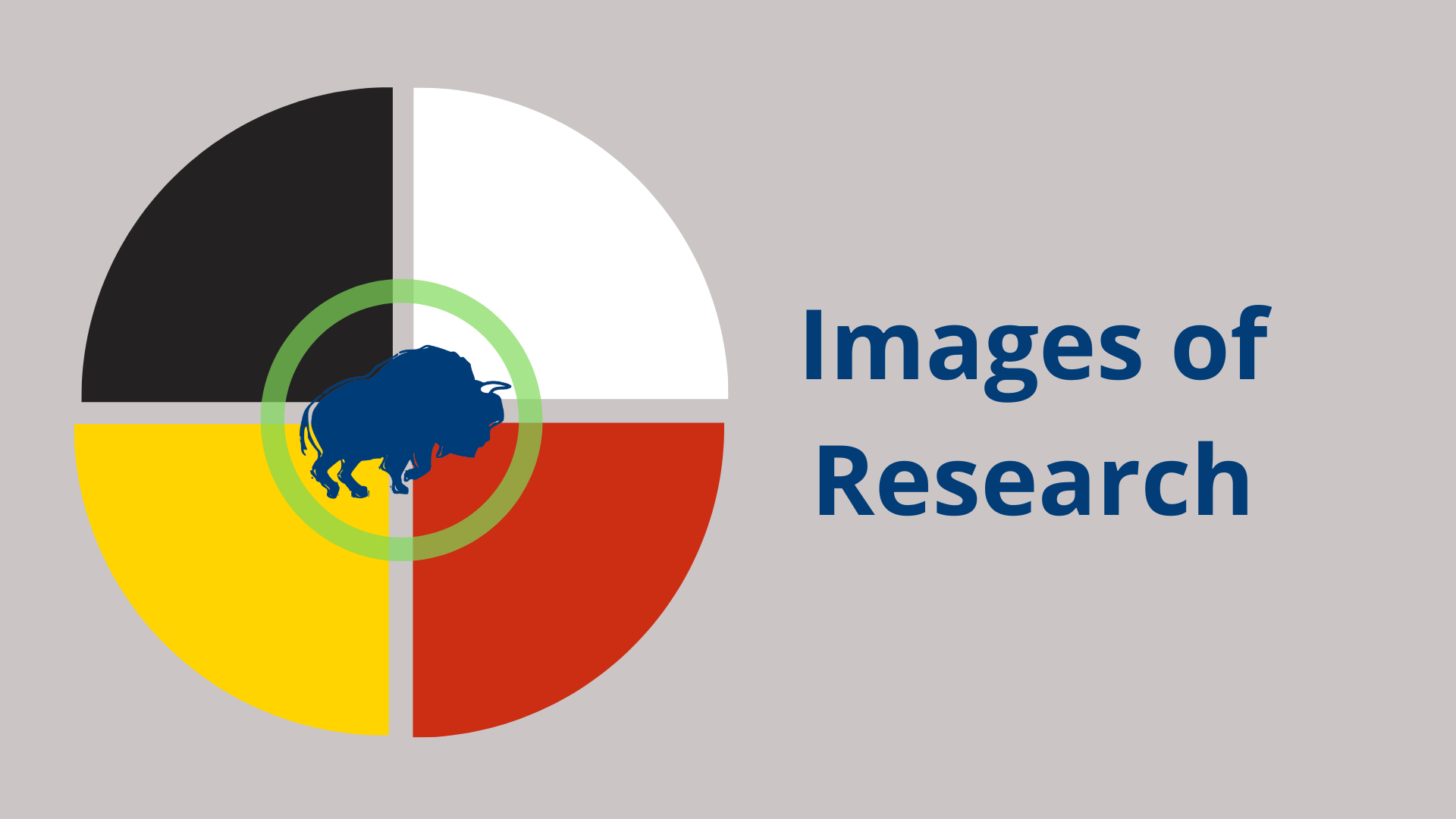
2024 Images of Research
Saturday, March 23, 2024 | Immediately following 3MT Live Finals | Science Commons SA 6008 and Online
Don't forget to vote for the People's choice!
Voting opens on Friday, March 22nd, 2024, at Noon MST and closes on Saturday, March 23rd, 2024 at 11:55 AM MST. Voting will be open for 24 hours.
2024 Images of Research People's Choice Voting Form
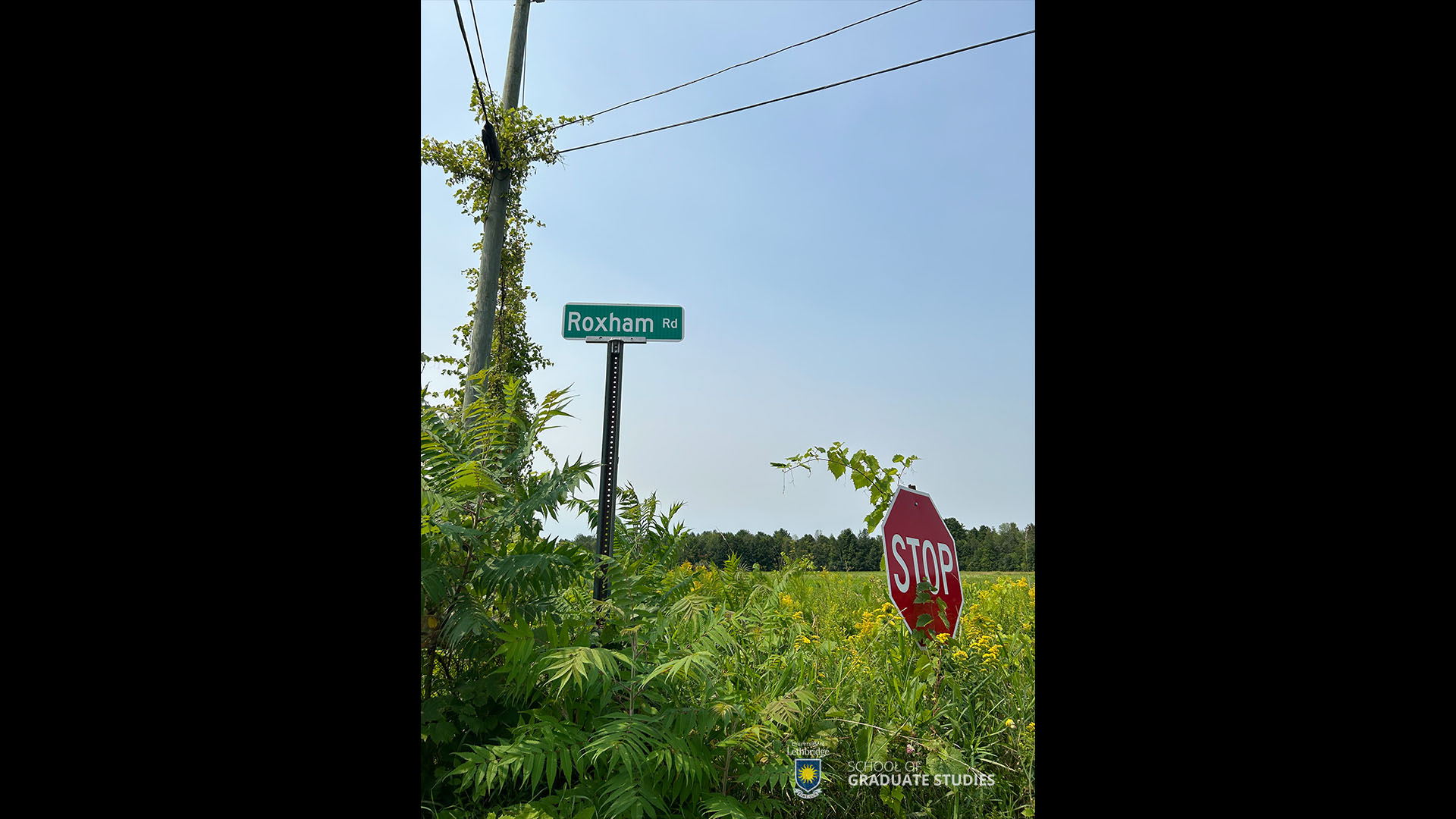
A Road Less Travelled
Supervisor: Julie Young
Abstract:
In the summer of 2023, my supervisor and I travelled to northern New York State so that I could complete my field work. One component of this was to visit Roxham Road - an unofficial border crossing between Quebec and New York State. It has been quite prevalent in the media recently as it is a key site for researchers analyzing how border policies impact immigration. For example, from early 2017 to the recent closure of this border crossing in 2023, over 100,000 migrants have passed through Roxham Road, and while I was there, I was informed that it is now rare to see people travelling to the crossing. This information makes the photo of the overgrown road and stop signs an artifact of the impacts of shifting border policies on where migrants are making their journeys between Canada and the US.
Participant Bio:
I am in my second year of my MA in Human Geography and did my bachelor's degree in Archaeology. My research examines how Canada-US border policies affect the interactions between migrants, advocates, businesses, and objects in the border community of Plattsburgh, New York. Overall, my project is on borders and immigration with a supplemental component of contemporary archaeology as I focus on artifacts, such as infrastructure and objects, associated with migration.
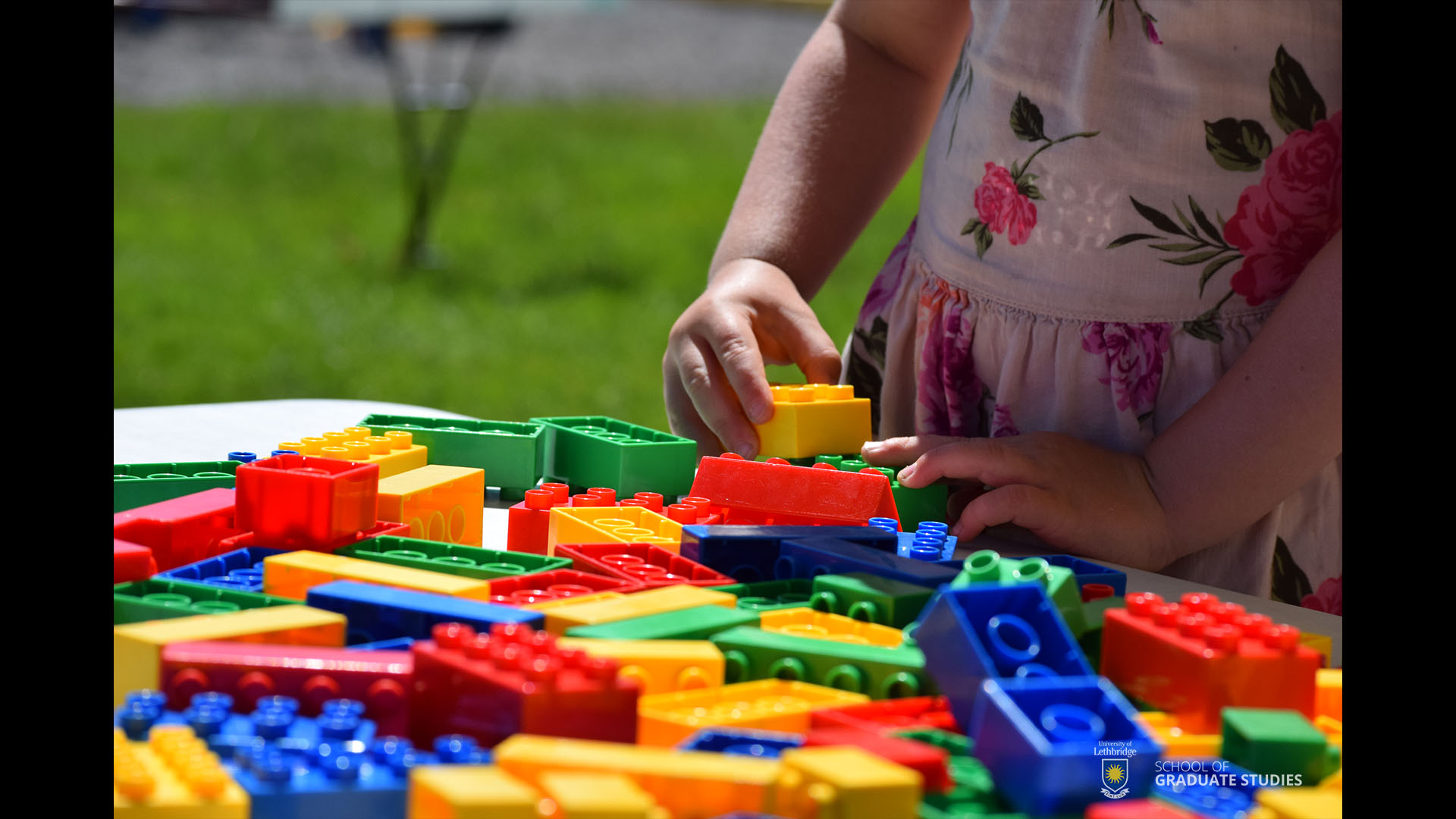
Building Executive Functions Through Play
Supervisor: Dr. Robbin Gibb
Abstract:
Play is essential for children! Whether it's running through the grass or constructing a lego mansion, play allows children to test boundaries, develop executive functions and be creative. My research tests different curricula to determine whether they are effective interventions for children's executive functions. One of the games involved in both the children and adolescent's curriculum involves lego. While working with my supervisor's organization, Building Brains Together, over the summer, we get the opportunity to build executive functions through playing with kids! This image is a young girl that came to our events multiple times and was always drawn to the colorful lego.
Participant Bio:
I am a Master of Science, Neuroscience student, and I work in more of an educational psychology space. My work focuses on testing interventions for youth executive functions, and one of these activities involves lego! Not only is lego a part of of the game curriculum, but it's also part of the testing. Dr. Claudia Gonzalez's lab developed a lego motor task that is used to look at handedness in relation to executive functioning capacities. Through our work with Building Brains Together, our lab gets the fantastic opportunity to play with lego with kids of all ages!

Plant hula hoop
Supervisor: Dr. Jenny McCune
Abstract:
A hula hoop, centered on a spotted wintergreen (Chimaphila maculata) plant (marked by a flag) in a forest fragment in southern Ontario, can show how dense plants grow around a spotted wintergreen. The spotted wintergreen is a small woodland plant, with dark green leaves that have a white stripe down the middle. It is rare in Canada, and research on the viability of known populations and environmental effects on population change can contribute to conservation of the species. Plant density can influence population growth rates, while knowing what species occur in close proximity to the spotted wintergreen can provide information on what plants typically grow in the same environment. In addition to plant density, I’m also collecting census data on some of these individual plants and environmental data including light availability, to model the population growth rates and whether environmental factors influence population growth rates.
Participant Bio:
I am studying the population demographics of four rare plant species in forests in southern Ontario. I will construct population models with demographic data from the four species to model the growth rates of some populations. I will also link the growth rates to local and landscape-scale environmental factors to better understand how the environment influences the population growth rates of these rare plants, which can contribute to both the knowledge of these species and their conservation.
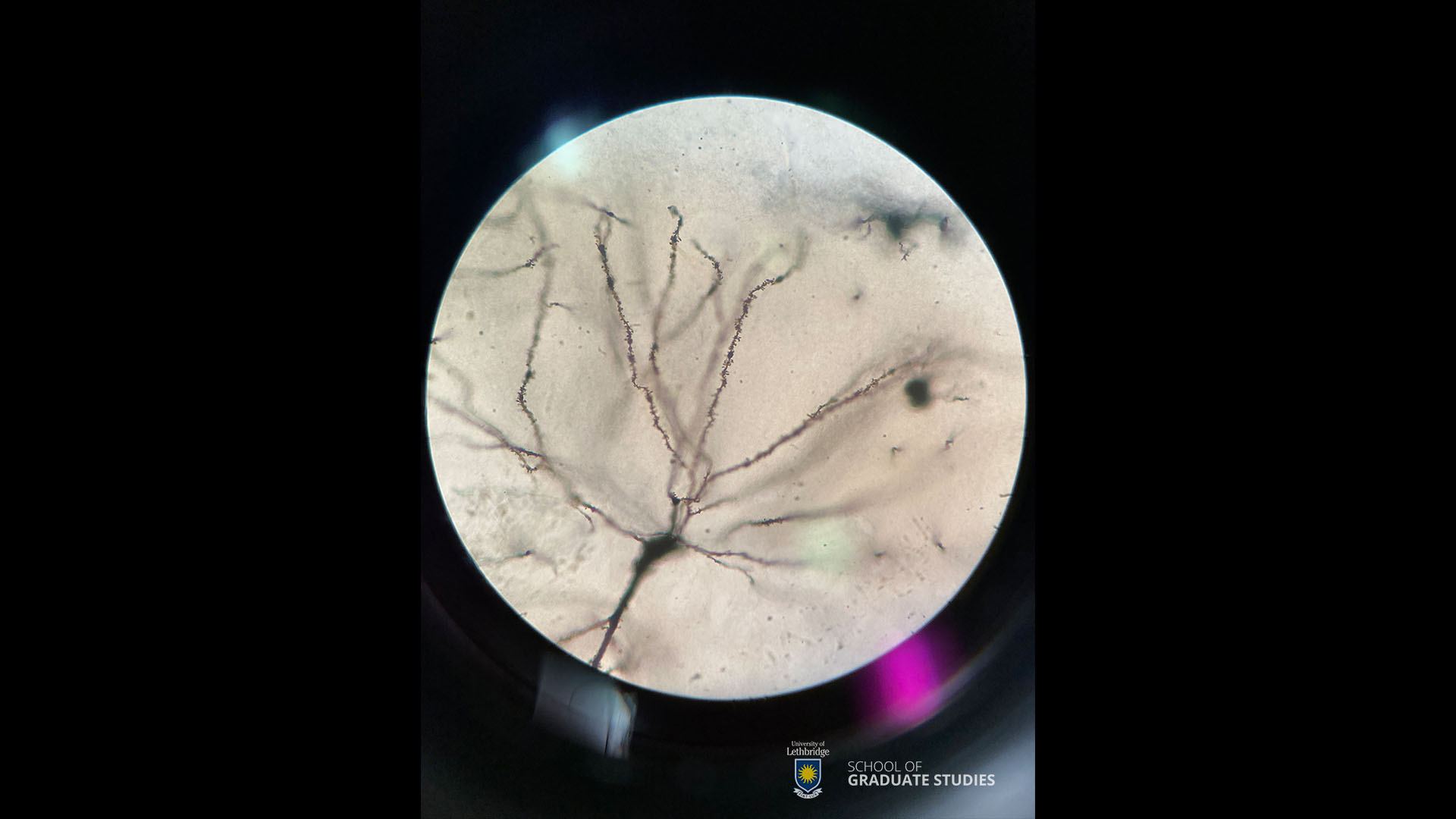
Magic Touch?
Supervisor: Dr. Robbin Gibb
Abstract:
We know that recent studies from the CCBN have shown that Tactile Stimulation (loving touch) slows the onset of Alzheimer’s disease in aging mice. I want to know if touch can transcend generations. If it can, imagine if we could go back a generation and prevent the disease in the first place.
This image may hold the answers. I took this photo through the eye piece of my microscope at 100X magnification. It is a stained brain cell from the offspring of a male rat, who received extra pets 3 times a day for 2 weeks, prior to conception. This cell is in the area of the brain responsible for forming memory and where Alzheimer’s dementia sets in. The bumps or buds along the branches are called spines and each one is where another brain cell connects to ‘’talk” to each other. You are seeing where memories were formed.
Participant Bio:
I am a second year MSc graduate student in the department of Neuroscience under the supervision of Dr. Robbin Gibb. I am a mother of 3, wife and avid volunteer. I am research how pre-conception tactile stimulation in fathers (Long-Evans Rats) prior to conception impacts their babies brains and behaviour.
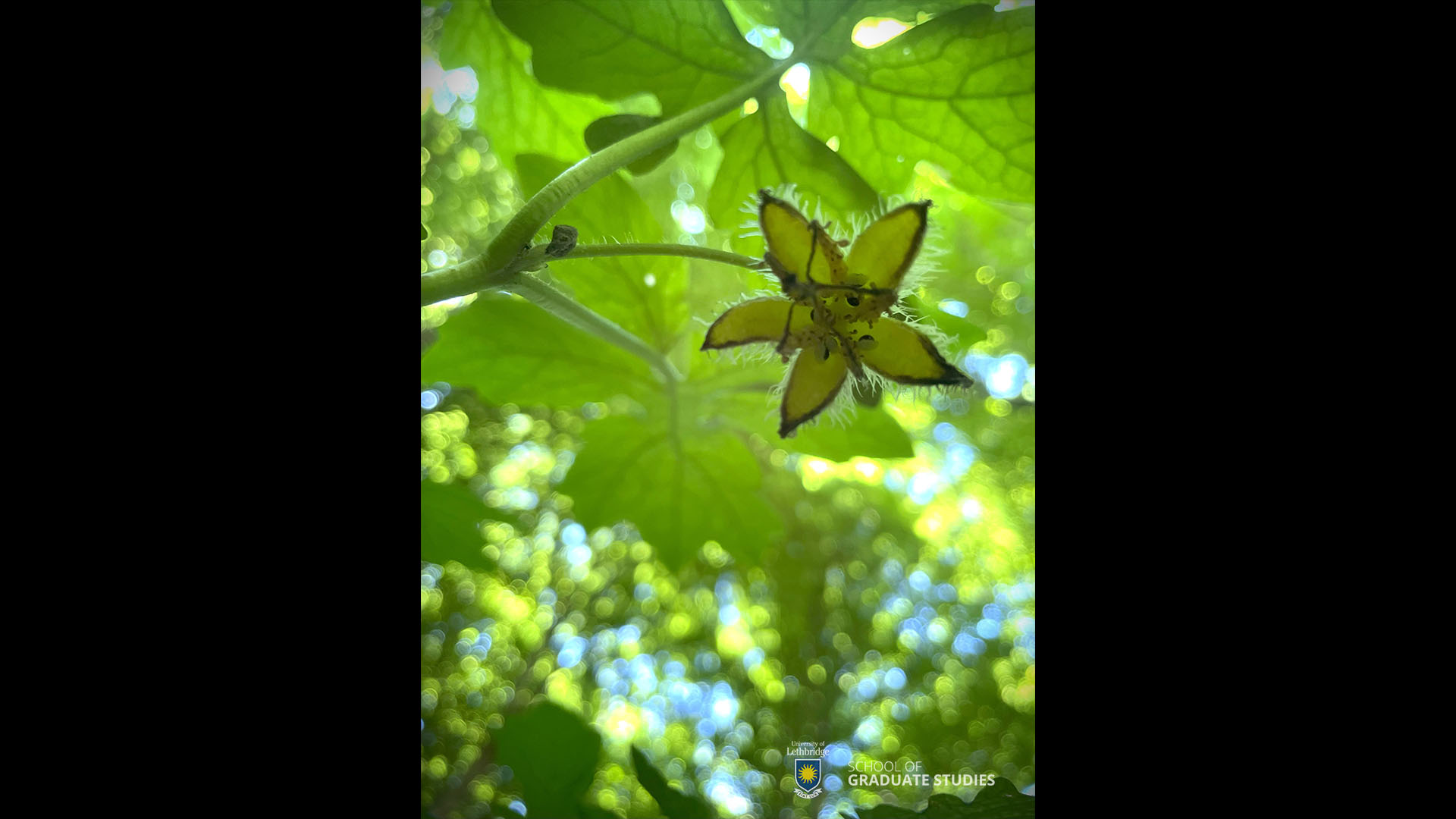
Star of the Woods
Supervisor: Dr. Jenny L. McCune
Abstract:
Exploding like star in space, the hairy fruit of the endangered wood-poppy bursts open, exposing tiny seeds. The seeds symbolize opportunities for this species to spread. The ants invade the vicinity of the plant and abduct the seeds, harvesting the attached jelly-like treats. Unintentionally, they serve the plant by dispersing the seeds in the process. However, wood-poppy’s habitat is now reduced to tiny islands of green due to land conversion, making it a challenge to breach new territory. My research tests experimental re-introductions into unoccupied habitat to help secure its future. Monitoring my plantings I found wood poppy will survive in a wide range of habitat suitability. Therefore, maybe the seeds just need a bigger helping hand than the ants to get around. If we can increase the number of populations, we can reduce its’ extinction risk and keep this star of the woods from burning out on our planet.
Participant Bio:
I am a PhD candidate studying ecology in the McCune lab. My research focuses on rare plant conservation and experimental translocation (re-introductions) in southern Ontario. I grew up in Athabasca, Alberta and have always enjoying being outdoors. My project gives me the opportunity to live the naturalist dream and spend my summers conducting field work in the woods, while making an impact for plant species at-risk.
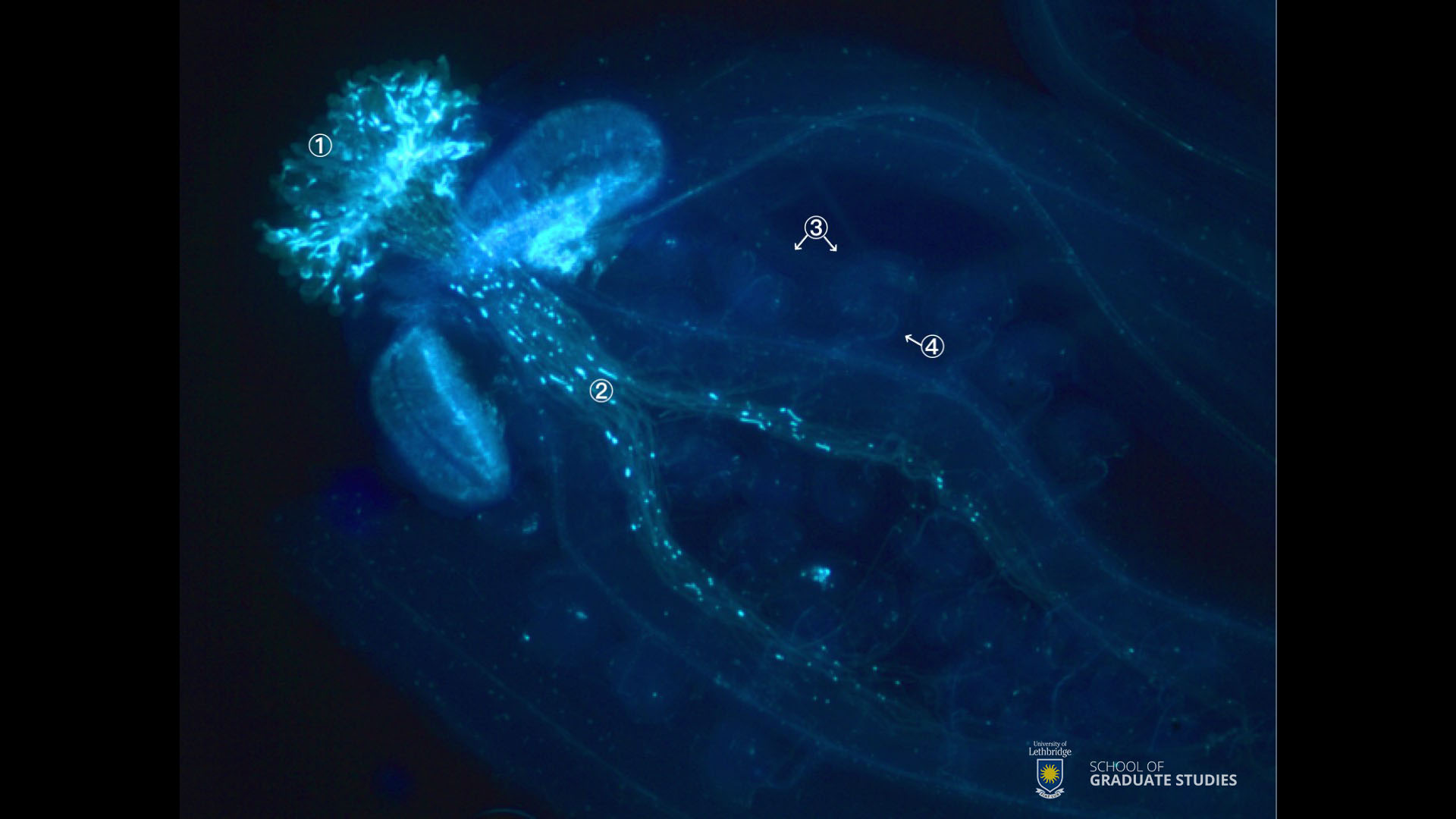
Journey to the Center of a Flower
Supervisor: Elizabeth Schultz
Abstract:
The food we eat, clothes we wear, and homes we live in all began with a single seed. A flower contains the structures required to make a seed and this process begins with pollen making its journey to the center of a flower.
Pollen lands on top of a flower (1), and forms pollen tubes (2) that grow down towards the ovules (3). When a pollen tube reaches an ovule it enters (4) and releases a sperm cell that fertilizes the egg. This process begins the development of a seed which will grow into a new plant.
My research examines genes required for successful seed production in the model plant Arabidopsis to better understand this critical process. We can visualize this by staining a flower with dye and exciting it with fluorescent light, allowing us to see each step of a pollen grain’s journey to ultimately form a seed.
Participant Bio:
Jaxon is a MSc. student working on plant development and genetic research with Dr. Elizabeth Schultz. He enjoys teaching undergraduate students and helping them gain a better understanding of and fascination for biology. He also enjoys continuing to learn about the fascinating world of plants and is thankful for the experiences and many mentors he has had here at the University of Lethbridge.
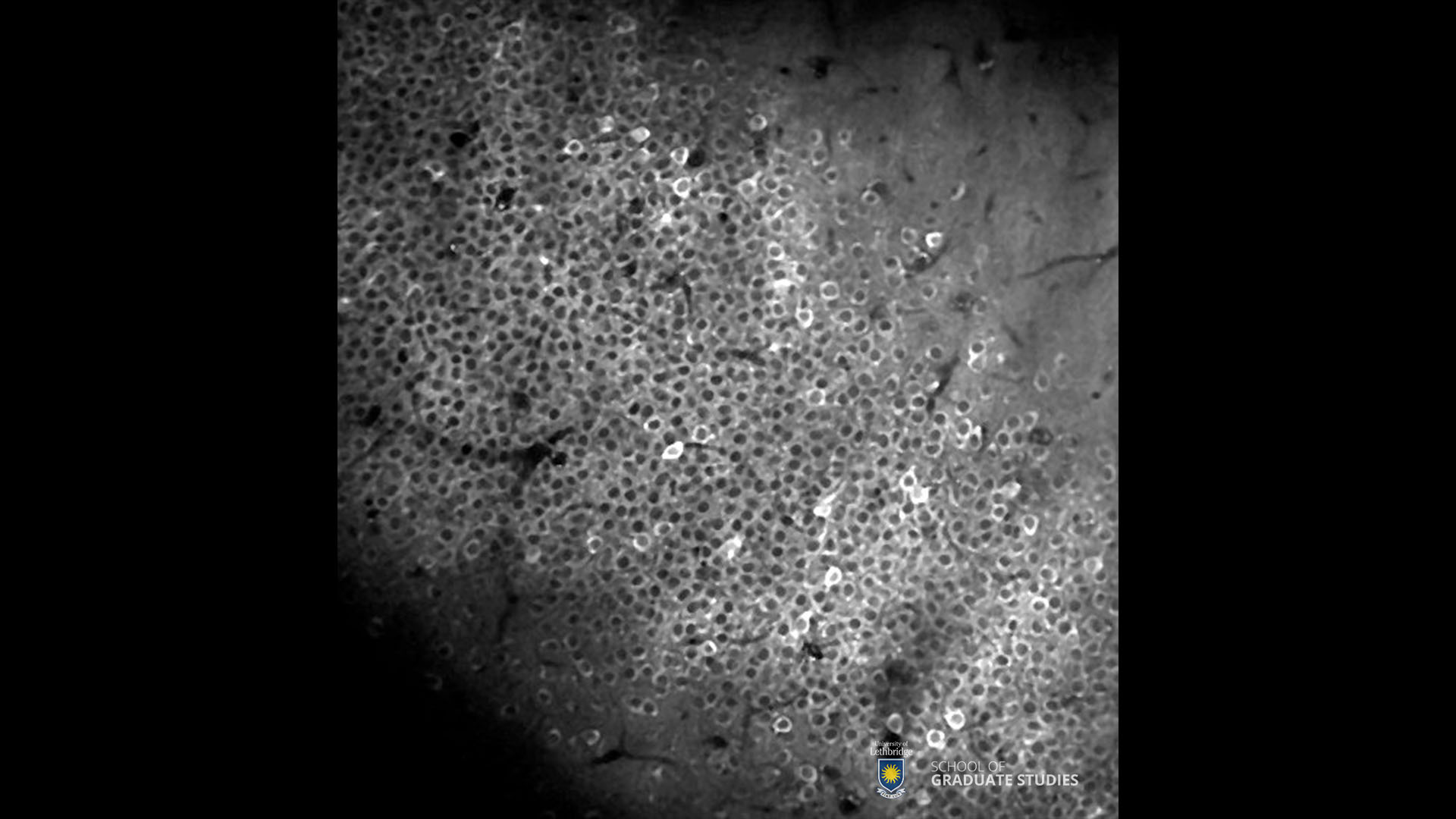
Lighting Up Learning
Supervisor: Bruce McNaughton
Abstract:
The intricate workings of our brain's memory systems allow us to store and recall information from our environment helping us react appropriately. This image shows the activity of CA1 hippocampal neurons, in a mouse navigating a belt, guided by cues that lead to a water reward, with neurons firing at a specific location each time creating a map of memory in action. This phenomenon is made visible through a modified protein that fluoresces when calcium enters cells, highlighting neuron firing. Captured using two-photon microscopy this image not only demonstrates advancements in neural imaging but also reveals the dynamic interactions within our brain network during learning tasks. My research aims to study the neural underpinnings of memory formation and explore how these processes deteriorate with age or due to neurodegenerative diseases, offering insights into preserving cognitive functions.
Participant Bio:
I enrolled in a Ph.D. program in Neuroscience (fast-tracked from Master’s) at the University of Lethbridge in 2021, under the supervision of Dr. Bruce McNaughton, where I conduct two-photon calcium imaging to monitor neuronal activities and population dynamics in awake and behaving mice. My current work focuses on understanding the hippocampal -cortical interactions underlying memory consolidation and retrieval in mice.
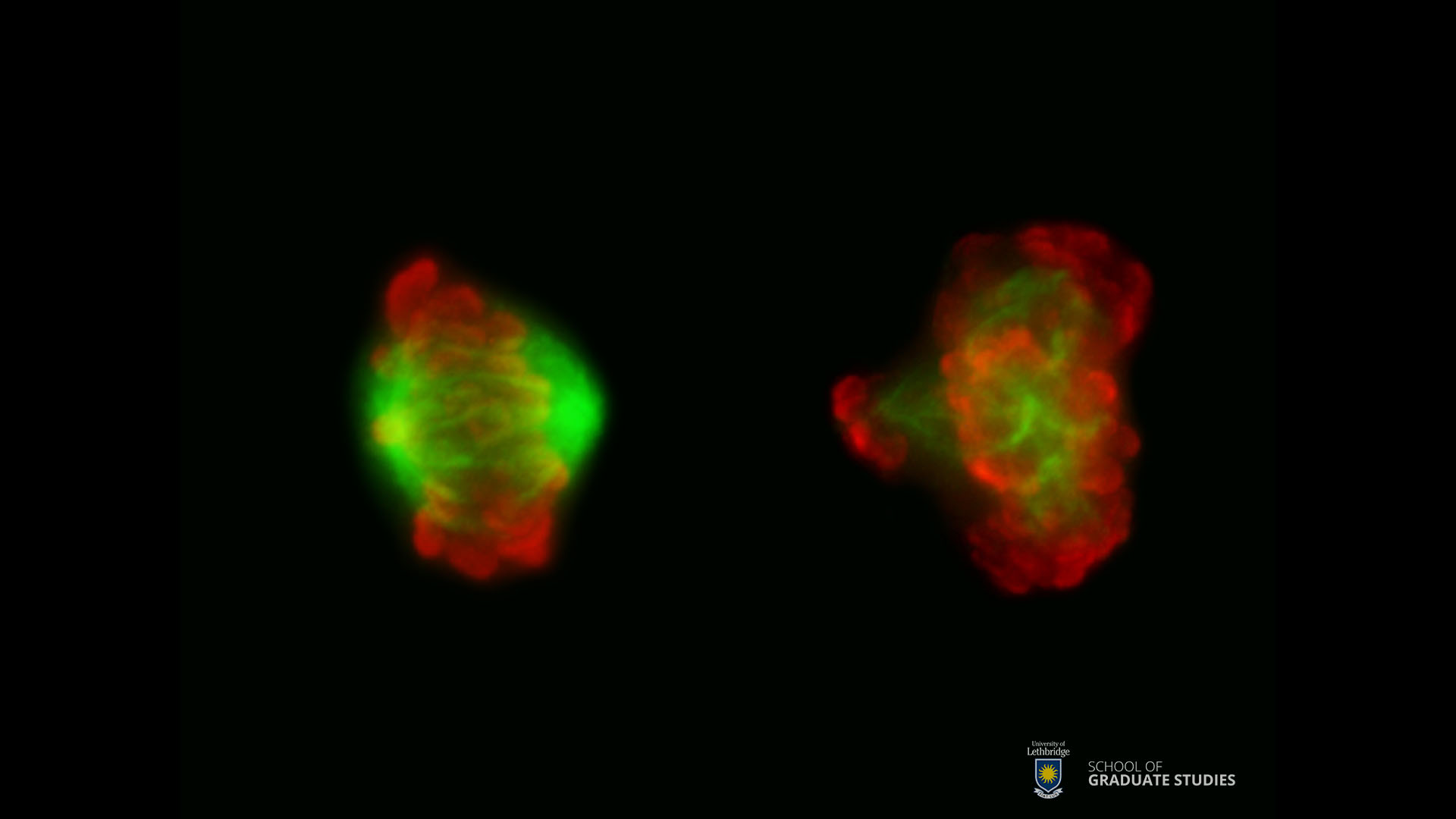
Divide and Conquer
Supervisor: Dr. Roy Golsteyn
Abstract:
In our bodies, cell division is essential for growth and repair. However, uncontrolled and continuous cell division can lead to cancer. This image showcases a cancer cell preparing to divide (left), with its DNA (red) perfectly aligned in the middle from which the mechanical protein tubulin (green) will divide the DNA into two new cells. Through my research, I have identified natural product compounds from Canadian prairie plants that inhibit cancer cell division. On the right is a cancer cell treated with a Glacier Lily extract, Erythronium grandiflorum, which results in the DNA being misaligned and prevents the cell from dividing—the key objective of anti-cancer treatments. The anti-cancer properties of the Glacier Lily, as well as several other Canadian prairie plants identified in our laboratory, can help scientist to learn more about effective ways to inhibit cancer cell division and work towards developing new medicines.
Participant Bio:
Shannon is a graduate student studying the bio-activities of Canadian prairie plants. This semester, she will be defending her master's thesis titled "Investigating the structure-function relationship of anti-mitotic natural products in Canadian prairie plants".
Other Information
To learn more about the GSA’s Meeting of the Minds conference, visit: https://www.ulethbridge.ca/notice/events/meeting-minds-2024
To view the 2023 3MT and Images of Research Competitions, visit: https://www.ulethbridge.ca/graduate-studies/thrive/3mt-images-research-2023
To learn more about 3MT International, including origins and other competitions, visit https://threeminutethesis.uq.edu.au/
Please email sgs.pd@uleth.ca with any questions
